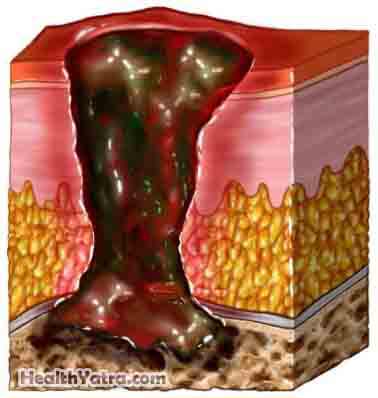Definition
Osteomyelitis is an infection of the bone. The infection may be:
- Acute (for a short time)
- Chronic (lasting for a long time)
In adults, the pelvis and vertebrae (bones of the back) are the most common sites. In children, the long bones are most likely to be affected. These are found in arms and legs.
Causes
This infection can occur as a result of an injury to the bone. It can also be caused by an infection in the body carried by the blood.
Risk Factors
Factors that increase your chance of osteomyelitis include:
- Age: young children and older adults
- Sex: male
- Trauma or injury to the bone and skin
- Broken bones, especially if open to or sticking through the skin
- Diabetes mellitus
- Kidney dialysis
- Intravenous drug abuse
- Weakened immune system
- Poor circulation
- Sickle cell anemia
- Any operation on a joint or bone, such as a hip replacement or internal fixation of a fracture
Symptoms
Symptoms include:
- Bone pain
- Fever or chills
- Tenderness, warmth, swelling, or redness of the skin or joint
- Drainage of pus
- Nausea
- Fatigue or irritability
- Restricted movement of the area
- A sore over bone that does not heal

Diagnosis
Your doctor will ask about your symptoms and medical history. A physical exam will be done. Tests may include:
- Blood tests—to check for signs of infection
- Needle aspiration of a joint—use of a needle to remove a sample for testing and culture
- Bone biopsy—removal of a sample of bone to test for abnormal cells
- X-rays—bone and tissue changes on x-ray may indicate osteomyelitis
- Bone scan—a series of pictures of bones taken after injection of a small amount of radioactive material that highlights the bones
- CT or MRI—radiographic tests to evaluate any bone changes that may indicate osteomyelitis
Treatment
Your doctor may immobilize the affected area with a splint. He or she may also recommend avoiding any weight bearing on the area.
Antibiotics
This infection is treated with antibiotics. They are given by IV and sometimes by mouth.
- Acute osteomyelitis is treated for at least 4-6 weeks
- Chronic osteomyelitis may require antibiotics for a longer period of time
Surgery
For chronic infection, surgery may be required to:
- Clean infected bone via scraping and irrigating the area
- Remove any fragments of dead bone or tissue that may prolong the infection
In severe cases, amputation may be necessary.
Skin Graft
In some situations, your doctor may recommend a skin graft. The skin in the affected area is replaced with healthy skin taken from another part of your body.
If you are diagnosed with osteomyelitis, follow your doctor’s instructions.
Prevention
To reduce your risk of getting osteomyelitis:
- Seek immediate medical care for infections or injuries.
- Keep diabetes under good control.
- Do not use illegal drugs.
- See your doctor for any sores that do not heal.
- If you smoke, quit.
